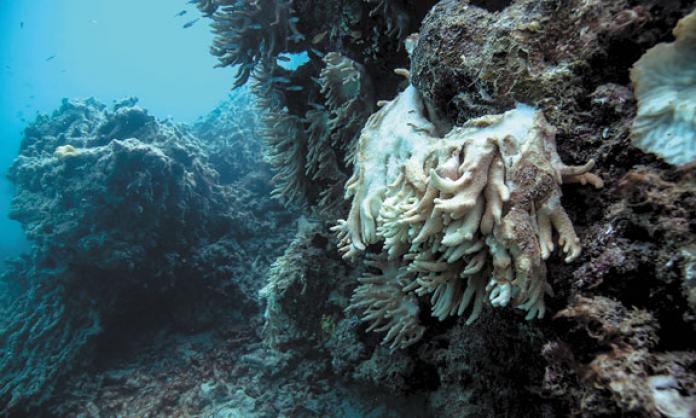Vast areas of previously colourful and thriving coral are slowly suffocating. Once pristine reefs are covered with green, slimy algae. The stench of death – of the rotting flesh of millions of tiny animals, the polyps that make up the coral – is everywhere. The Great Barrier Reef is dying.
A 2012 study by the Australian Institute of Marine Science found the reef had lost half its coral in the last three decades. This year, another 22 percent has been wiped out by bleaching, according to the Great Barrier Reef Marine Park Authority.
The permanent destruction of most, if not all, of the Great Barrier Reef looks increasingly likely to occur in the space of a couple of generations. This year’s mass bleaching was caused by warmer than average water temperatures. If current trends continue, this will be the new normal.
According to the UN, a 2 degree rise in average temperatures would result in the loss of more than 95 percent of coral around the world. Even if all the emissions reduction pledges made at last December’s climate summit in Paris are met, which seems unlikely, we will overshoot this.
In the face of the current devastation of the reef, you might expect that politicians and other elite decision makers would have roused themselves into some kind of action. And, indeed, they have – though not what you would think.
The Australian government has acted swiftly, not to reduce pollution on the reef and accelerate the shift away from fossil fuels, but to sweep it all under the carpet. Most recently, this involved pressuring UNESCO to remove any references to Australia from a report on world heritage areas threatened by climate change.
The justification provided by an environment department spokesperson was telling: “Recent experience in Australia had shown that negative commentary about the status of world heritage properties impacted on tourism”.
To the extent that politicians and big business care about the environment at all, it’s as a potential source of profit. It’s estimated that tourism centred on the Great Barrier Reef brings in around $6 billion annually. The immediate priority, as the government sees it, is not to protect the reef, but to protect the flow of profit by keeping any talk of its destruction out of the media.
Where the sustainability imperative directly conflicts with the drive to profit, as it does in the case of Australia’s mining industry, the latter will always win out. Even the $6 billion in tourism revenue seems like a modest sum compared to the immense amounts made by shipping coal and other minerals out through the reef to China.
On the surface, this seems like a case of short-term thinking. From a capitalist perspective, though, it isn’t. In a reef-less world there will be other ways for fortunes to be won.
Perhaps some of the thousands of species of marine life being driven to extinction could profitably be farmed. Perhaps people would pay top dollar to companies offering simulated reef experiences as an escape from the dull drudgery of life in an environmentally and socially impoverished society.
A world without the reef would be a lesser world than the one we live in today. To avoid bequeathing this to future generations, we need a revolution. Only a socialist system, in which the resources of society can be quickly and fully mobilised to create a sustainable, fossil-free economy, can save the reef.









